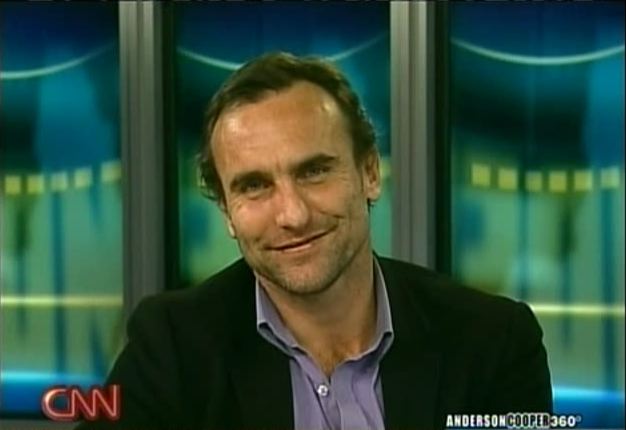AC: "There are so many games in play here we can't even begin to describe them."

Length: 4:49
LARGE (56.5 MB) ----- SMALL (5.6 MB)
Erica Hill spoke to Michael earlier in the day, and he once again tries to sound-bite the complex situation in Iraq into five-minutes-or-less.
ANDERSON COOPER: Up next, Baghdad's Green Zone under attack, two Americans killed this week, raging violence. What can be done, if anything, to stop it? And what does it mean, what does it portend about a possible pull-out? We'll talk with CNN's Michael Ware coming up.
(COMMERCIAL BREAK)
(BEGIN VIDEO CLIP)
(GUNFIRE)
(END VIDEO CLIP)
COOPER: The crack of gunfire on the streets of Basra in southern Iraq. After months of reduced violence, Iraq is once again erupting. The violence is widespread. In Basra, the Iraqi army is engaged in a fierce battle with the followers of Shia cleric Muqtada al-Sadr. Iraq's government is trying to crush al-Sadr's forces. The fighting has left scores dead.
And in Baghdad, insurgents continue their assault on the heavily fortified Green Zone. Members of the U.S. embassy are being told to stay inside. Two Americans have been killed after five days of rocket -- excuse me, after days of rocket attacks. And a city-wide curfew is in effect through Sunday evening.
Now today, President Bush stood firm, saying the so-called surge is working and, quote, "the progress in Iraq is real," unquote. The question is, is it?
For a reality check, Erica Hill spoke to CNN's Michael Ware, who's been covering the war in Iraq since it began.
(BEGIN VIDEOTAPE)
ERICA HILL: Michael, with everything we've been seeing lately and now the U.S. embassy telling employees to stay inside because of the violence, can you tell us why there's such an uptick? Why now?
MICHAEL WARE, CNN CORRESPONDENT: Well, this has been triggered by an Iraqi government offensive in the southern oil-rich city of Basra. Now, that's a city that's controlled by a number of militia factions. Now, whilst the Iraqi government and the U.S. military is very keen to dress this up as a bold decision targeting criminal elements, in the ultimate washout, the real target of this offensive will invariably be the Mehdi Army militia, which is loyal to the anti-American cleric Muqtada al-Sadr.
E. HILL: But isn't there also -- and correct me if I'm wrong here, Michael, but there's also the issue that in Basra specifically, a lot of the forces there, I think more than half of them, maybe 16,000 of the Basra police force, they're also -- have been said to be infiltrated with the very militia they're supposed to be fighting.
WARE: Oh, absolutely. I mean, in one sense there's no such thing as an Iraqi police force. I mean, these are localized groups put in police uniforms, largely funded by the Americans and trained by Americans. But they're either Sunni insurgent groups who serve in their hometown or their local militia forces backed by Iran who serve in their hometown.
Basra is no different. However, in Basra, we have a whole rainbow alliance of Iranian-backed or Iranian-linked or Iranian-supported militias.
Now, the provincial government is controlled by one group. Now, they're not completely aligned with Iran, but they're not separate from Iran. The streets, in many ways, are dominated by the Mehdi Army militia of Muqtada al-Sadr who has links to Iran but is not beholden to Iran.
Yet, this central government, who is launching this offensive, is very much in so many ways, through its key factions, tied intricately with Iran. Yet, America must inevitably throw its lot in with this government.
So this is a very complicated picture. There are so many games in play here we can't even begin to describe them.
E. HILL: I know. And frankly, it's tough to keep them all straight. But I would imagine one of the other major concerns here is the fact that this violence in Basra, in the southern part of the country, could spread?
WARE: Well, it could spread in a number of ways. I mean, in one sense, the potential is that this will be limited to Shia-dominated areas. That's largely southern Iraq, which is heavily overwhelmed by Iranian influence, not American influence. Certainly, not British influence, who were given control of that area, and they've retreated to their air base outside of Basra and have no ability to change this environment whatsoever.
However, could it spread to the rest of the country? Northern Iraq? No. The Kurds are very happy to see Arabs fighting Arabs, whether they be Iranian-backed or backed by other Arab countries.
The Sunnis now, 70,000 of whom were killing Americans but are now on the U.S. government payroll, will have a key strategic decision to make. Do we try and capitalize on this internal Shia-on-Shia, pro-Iranian backed factional fighting or do we stand back, let them kill each other and then step in?
So there's a potential for this to go any number of ways, all of which are complicated, all of which add to the woes of the U.S. mission, and all of which risk jeopardizing the gains of the so-called surge.
E. HILL: Last thing that I think anyone wants to hear, unfortunately. Michael Ware, always appreciate the insight.
WARE: Thank you.
(END VIDEOTAPE)
